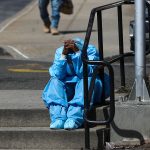Among the many impacts of the COVID-19 pandemic, its effects on mental health have proven to be widespread and substantial. In January 2021, four out of 10 adults in the United States reported symptoms of anxiety or depression disorder – a 400 percent increase from January 2019. Health care workers are particularly exposed: more than half of workers on the front line could be at risk for one or more mental health problems, alongside the health risks involved in working with COVID-19 patients.
Children are also facing a mental health crisis during the pandemic. Emergency department visits by children for mental health issues went up about 30 percent for kids ages 12-17 and 24 percent for children ages 5-11 between March and October of 2020. Unstable learning environments, prolonged isolation, housing insecurity, systemic racism, and various other factors are all making children vulnerable to burnout. Burnout is characterized by symptoms of physical or emotional exhaustion caused by long-term stress.
Children and health care workers of color are especially at risk, compounding the effects of systemic racism.
Physicians for Human Rights (PHR) hosted a discussion on the mental health impacts of the pandemic and solutions to expand and encourage access to mental health care as part of PHR’s COVID-19 webinar series. PHR Board Member Gail Saltz, MD moderated the discussion. She was joined by Felton Earls, MD, emeritus professor of human behavior and development at Harvard T.H. Chan School of Public Health and emeritus professor of social medicine at Harvard Medical School; Jessica Gold, MD, MS, assistant professor and director of wellness, engagement, and outreach at the Washington University School of Medicine; and Matthew Howard, DNP, RN, CEN TCRN, CPEN, CPN, director of scholarship and leadership resources at Sigma Theta Tau International Honor Society of nursing, part-time staff nurse in the emergency department at Eskenazi Health in Indianapolis, and nursing faculty in the graduate and doctoral programs at Northern Kentucky University.
Front Line Workers and Pandemic Burnout
In the webinar, panelists talked about how health care workers are especially susceptible to burnout. Health care work can be psychologically and physically draining, yet this often goes unnoticed. Even before COVID-19, physicians had the highest suicide rate among every profession, and nurses had higher suicide rates than the general population.
Only three percent of psychiatrists are Black, posing further barriers to Black health care workers looking for help.
“Most of us work 12-hour shifts at a facility or a hospital,” Howard, a frontline nurse, said. “We do see patients the entire time. One of the biggest things, in the emergency department at least, is, as we start, we’re gowned, we’re gloved, we’re masked, and we pretty much stay that way the entire time.” This can be extremely mentally and physically taxing, as being fully gowned, masked, and gloved can make someone more hesitant about attending to their own physical needs during their long shift.
Health care workers of color have been at a particular disadvantage during the pandemic, Dr. Gold pointed out. They are dying in more significant numbers than white health care workers and are less likely to seek out mental health services. Importantly, only three percent of psychiatrists are Black, posing further barriers to Black health care workers looking for help.
Much of the struggle comes from rapidly changing work environments, where health care workers are experiencing things that are painful to process. Many have never said out loud that what they are seeing is hard and “That they’re allowed to say that, that they’re allowed to have feelings, that they’re allowed to be struggling, and that coming to me is not a weakness in any sort of way,” Dr. Gold said.
Pandemic Burnout in Children
The pandemic has also left children, particularly those in Black and brown neighborhoods, without the usual mentorship and support they would receive from their communities, families, and educators, according to Dr. Earl. Accessibility is an important factor for children experiencing the pandemic, as a lack of resources can substantially change how children navigate online learning.
In wealthier neighborhoods, schools have the resources to accommodate children in safer ways, including the implementation of hybrid schooling. “Those students who are attending private schools and schools that are open more than closed are having their stress buffered more than those in neighborhoods dealing with racial injustice, at the same time the consequences of the pandemic, and the combined impacts of those two epidemics on children has to be considerable,” Dr. Earl said.
So, what can be done to support health care workers and children experiencing burnout?
One important step is building trust. “Having the experience and the belief that the organizations around you, the schools, the health care centers, the businesses, and government, are working for you and not against you is the most important single factor,” Dr. Earl said.
“Those students who are attending private schools and schools that are open more than closed are having their stress buffered more than those in neighborhoods dealing with racial injustice.”
Felton Earls, MD, emeritus professor of human behavior and development at Harvard T.H. Chan School of Public Health and emeritus professor of social medicine at Harvard Medical School
And while individual efforts to improve burnout are helpful, Dr. Gold stressed that real change needs to be enacted systemically. “The system has to acknowledge it has a problem,” she noted. “We have to say, hey, we’ve had a problem for a long time, and a lecture on burnout is not going to fix it.”
Instead, what is needed are long-term financial investments in addressing the mental health issues facing health care workers, alongside advocacy for more supportive work environments.
As for children, they must be supported in ways that respect their ideas and emotions, Dr. Earl suggested. The impact of the pandemic and systemic racism cannot be reversed or diluted, but there is value in honoring the ways children have been feeling during these difficult times.

